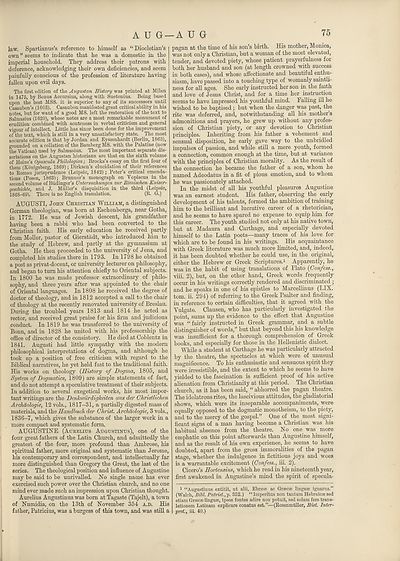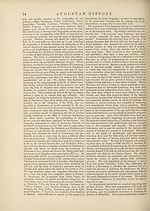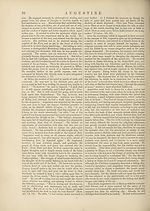Encyclopaedia Britannica > Volume 3, Athens-BOI
(87) Page 75
Download files
Complete book:
Individual page:
Thumbnail gallery: Grid view | List view

AUG
law. Spartianus’s reference to himself as “ Diocletian’s
own ” seems to indicate that he was a domestic in the
imperial household. They address their patrons with
deference, acknowledging their own deficiencies, and seem
painfully conscious of the profession of literature having
fallen upon evil days.
The first edition of the A ugustan History was printed at Milan
in 1475, by Bonus Aecursius, along with Suetonius. Being based
upon the best MSS. it is superior to any of its successors until
Casaubon’s (1603). Casaubon manifested great critical ability in his
notes, but for want of a good MS. left the restoration of the text to
Salniasius (1620), whose notes are a most remarkable monument of
erudition combined with acuteness in verbal criticism and general
vigour of intellect. Little has since been done for the improvement
of the text, which is still in a very unsatisfactory state. The most
accurate edition is that by Jordan and Eyssenhardt (Berlin, 1863),
grounded on a collation of the Bamberg MS. with the Palatine (now
the Vatican) used by Salmasius. The most important separate dis¬
sertations on the Augustan historians are that on the sixth volume
of Heine’s Opuscula Philologica; Brocks’s essay on the first four of
them (Kbnigsberg, 1869); Dirksen’s elucidation of their references
to Roman jurisprudence (Leipsic, 1842); Peter’s critical emenda¬
tions (Posen, 1863); Brunner’s monograph on Vopiscus in the
second volume of Biidinger’s Untersuchungen zur Romischen Kaiser-
geschichte, and J. Muller’s disquisition in the third (Leipsic,
1868-691. There is no English translation. (R. G.)
AUGUST1, John Christian William, a distinguished
German theologian, was born at Eschenberga, near Gotha,
in 1772. He was of Jewish descent, his grandfather
having been a rabbi who had been converted to the
Christian faith. His early education he received partly
from Moller, pastor of Gierstiidt, who introduced him to
the study of Hebrew, and partly at the gymnasium at
Gotha. He then proceeded to the university of Jena, and
completed his studies there in 1793. In 1798 he obtained
a post as privat-docent, or university lecturer on philosophy,
and began to turn his attention chiefly to Oriental subjects.
In 1800 he was made professor extraordinary of philo¬
sophy, and three years after was appointed to the chair
of Oriental languages. In 1808 he received the degree of
doctor of theology, and in 1812 accepted a call to the chair
of theology at the recently renovated university of Breslau.
During the troubled years 1813 and 1814 he acted as
rector, and received great praise for his firm and judicious
conduct. In 1819 he was transferred to the university of
Bonn, and in 1828 he united with his professorship the
office of director of the consistory. He died at Coblentz in
1841. Augusti had little sympathy with the modern
philosophical interpretations of dogma, and although he
took up a position of free criticism with regard to the
Biblical narratives, he yet held fast to the traditional faith.
His works on theology (History of Dogma, 1805, and
System of Dogmatics, 1809) are simple statements of fact,
and do not attempt a speculative treatment of their subjects.
In addition to several exegetical works, his most impor¬
tant writings are the Denkwiirdiglceiten aus der Christlichen
Archdologie, 12vols., 1817-31, a partially digested mass of
materials, and the Handbuch der Christ. Archdologie, 3 vols.,
1836-7, which gives the substance of the larger work in a
more compact and systematic form.
AUGUSTINE (Aurelius Augustinus), one of the
four great fathers of the Latin Church, and admittedly the
greatest of the four, more profound than Ambrose, his
spiritual father, more original and systematic than Jerome,
his contemporary and correspondent, and intellectually far
more distinguished than Gregory the Great, the last of the
series. The theological position and influence of Augustine
may be said to be unrivalled. No single name has ever
exercised such power over the Christian church, and no one
mind ever made such an impression upon Christian thought.
Aurelius Augustinus was born at Tagaste (Tajelt), a town
of Numidia, on the 13th of November 354 a.d. His
father, Patricius, was a burgess of this town, and was still a
-AUG 75
pagan at the time of his son’s birth. His mother, Monica,
was not only a Christian, but a woman of the most elevated,
tender, and devoted piety, whose patient prayerfulness foi
both her husband and son (at length crowned with success
in both cases), and whose affectionate and beautiful enthu¬
siasm, have passed into a touching type of womanly saintli¬
ness for all ages. She early instructed her son in the faith
and love of Jesus Christ, and for a time her instruction
seems to have impressed his youthful mind. Palling ill he
wished to be baptised; but when the danger was past, the
rite was deferred, and, notwithstanding all his mother’s
admonitions and prayers, he grew up without any profes¬
sion of Christian piety, or any devotion to Christian
principles. Inheriting from his father a vehement and
sensual disposition, he early gave way to the unbridled
impulses of passion, and while still a mere youth, formed
a connection, common enough at the time, but at variance
with the principles of Christian morality. As the result of
the connection he became the father of a son, whom he
named Adeodatus in a fit of pious emotion, and to whom
he was passionately attached.
In the midst of all his youthful pleasures Augustine
was an earnest student. His father, observing the early
development of his talents, formed the ambition of training
him to the brilliant and lucrative career of a rhetorician,
and he seems to have spared no expense to equip him for
this career. The youth studied not only at his native town,
but at Madaura and Carthage, and especially devoted
himself to the Latin poets—many traces of his love for
which are to be found in his writings. His acquaintance
with Greek literature was much more limited, and, indeed,
it has been doubted whether he could use, in the original,
either the Hebrew or Greek Scriptures.1 Apparently, he
was in the habit of using translations of Plato (Confess.,
viii. 2), but, on the other hand, Greek words frequently
occur in his writings correctly rendered and discriminated ;
and he speaks in one of his epistles to Marcellinus (LIX.
tom. ii. 294) of referring to the Greek Psalter and finding,
in reference to certain difficulties, that it agreed with the
Vulgate. Clausen, who has particularly investigated the
point, sums up the evidence to the effect that Augustine
was “ fairly instructed in Greek grammar, and a subtle
distinguisher of words,” but that beyond this his knowledge
was insufficient for a thorough comprehension of Greek
books, and especially for those in the Hellenistic dialect.
While a student at Carthage he was particularly attracted
by the theatre, the spectacles at which were of unusual
magnificence. To his enthusiastic and sensuous spirit they
were irresistible, and the extent to which he seems to have
yielded to the fascination is sufficient proof of his active
alienation from Christianity at this period. The Christian
church, as it has been said, “ abhorred the pagan theatre.
The idolatrous rites, the lascivious attitudes, the gladiatorial
shows, which were its inseparable accompaniments, were
equally opposed to the dogmatic monotheism, to the piety,
and to the mercy of the gospel.” One of the most signi¬
ficant signs of a man having become a Christian was his
habitual absence from the theatre. No one was more
emphatic on this point afterwards than Augustine himself,
and as the result of his own experience, he seems to have
doubted, apart from the gross immoralities of the pagan
stage, whether the indulgence in fictitious joys and woes
is a warrantable excitement (Confess., iii. 2).
Cicero’s Hortensius, which he read in his nineteenth year,
first awakened in Augustine’s mind the spirit of specula-
1 “Augustinus extitit, ut alii, Ebraase ac Graecae linguae ignarus.”
(Walch, Bibl. Patrist.,g. 352.) “ Imperitus non tantum Hebraicae sed
etiam Graecae linguae, ipsos fontes adire non potuit, sed solam fere trans-
lationem Latinam explicare conatus est.”—(Rosenmiiller, Hist. Inter¬
pret., iii. 40.)
law. Spartianus’s reference to himself as “ Diocletian’s
own ” seems to indicate that he was a domestic in the
imperial household. They address their patrons with
deference, acknowledging their own deficiencies, and seem
painfully conscious of the profession of literature having
fallen upon evil days.
The first edition of the A ugustan History was printed at Milan
in 1475, by Bonus Aecursius, along with Suetonius. Being based
upon the best MSS. it is superior to any of its successors until
Casaubon’s (1603). Casaubon manifested great critical ability in his
notes, but for want of a good MS. left the restoration of the text to
Salniasius (1620), whose notes are a most remarkable monument of
erudition combined with acuteness in verbal criticism and general
vigour of intellect. Little has since been done for the improvement
of the text, which is still in a very unsatisfactory state. The most
accurate edition is that by Jordan and Eyssenhardt (Berlin, 1863),
grounded on a collation of the Bamberg MS. with the Palatine (now
the Vatican) used by Salmasius. The most important separate dis¬
sertations on the Augustan historians are that on the sixth volume
of Heine’s Opuscula Philologica; Brocks’s essay on the first four of
them (Kbnigsberg, 1869); Dirksen’s elucidation of their references
to Roman jurisprudence (Leipsic, 1842); Peter’s critical emenda¬
tions (Posen, 1863); Brunner’s monograph on Vopiscus in the
second volume of Biidinger’s Untersuchungen zur Romischen Kaiser-
geschichte, and J. Muller’s disquisition in the third (Leipsic,
1868-691. There is no English translation. (R. G.)
AUGUST1, John Christian William, a distinguished
German theologian, was born at Eschenberga, near Gotha,
in 1772. He was of Jewish descent, his grandfather
having been a rabbi who had been converted to the
Christian faith. His early education he received partly
from Moller, pastor of Gierstiidt, who introduced him to
the study of Hebrew, and partly at the gymnasium at
Gotha. He then proceeded to the university of Jena, and
completed his studies there in 1793. In 1798 he obtained
a post as privat-docent, or university lecturer on philosophy,
and began to turn his attention chiefly to Oriental subjects.
In 1800 he was made professor extraordinary of philo¬
sophy, and three years after was appointed to the chair
of Oriental languages. In 1808 he received the degree of
doctor of theology, and in 1812 accepted a call to the chair
of theology at the recently renovated university of Breslau.
During the troubled years 1813 and 1814 he acted as
rector, and received great praise for his firm and judicious
conduct. In 1819 he was transferred to the university of
Bonn, and in 1828 he united with his professorship the
office of director of the consistory. He died at Coblentz in
1841. Augusti had little sympathy with the modern
philosophical interpretations of dogma, and although he
took up a position of free criticism with regard to the
Biblical narratives, he yet held fast to the traditional faith.
His works on theology (History of Dogma, 1805, and
System of Dogmatics, 1809) are simple statements of fact,
and do not attempt a speculative treatment of their subjects.
In addition to several exegetical works, his most impor¬
tant writings are the Denkwiirdiglceiten aus der Christlichen
Archdologie, 12vols., 1817-31, a partially digested mass of
materials, and the Handbuch der Christ. Archdologie, 3 vols.,
1836-7, which gives the substance of the larger work in a
more compact and systematic form.
AUGUSTINE (Aurelius Augustinus), one of the
four great fathers of the Latin Church, and admittedly the
greatest of the four, more profound than Ambrose, his
spiritual father, more original and systematic than Jerome,
his contemporary and correspondent, and intellectually far
more distinguished than Gregory the Great, the last of the
series. The theological position and influence of Augustine
may be said to be unrivalled. No single name has ever
exercised such power over the Christian church, and no one
mind ever made such an impression upon Christian thought.
Aurelius Augustinus was born at Tagaste (Tajelt), a town
of Numidia, on the 13th of November 354 a.d. His
father, Patricius, was a burgess of this town, and was still a
-AUG 75
pagan at the time of his son’s birth. His mother, Monica,
was not only a Christian, but a woman of the most elevated,
tender, and devoted piety, whose patient prayerfulness foi
both her husband and son (at length crowned with success
in both cases), and whose affectionate and beautiful enthu¬
siasm, have passed into a touching type of womanly saintli¬
ness for all ages. She early instructed her son in the faith
and love of Jesus Christ, and for a time her instruction
seems to have impressed his youthful mind. Palling ill he
wished to be baptised; but when the danger was past, the
rite was deferred, and, notwithstanding all his mother’s
admonitions and prayers, he grew up without any profes¬
sion of Christian piety, or any devotion to Christian
principles. Inheriting from his father a vehement and
sensual disposition, he early gave way to the unbridled
impulses of passion, and while still a mere youth, formed
a connection, common enough at the time, but at variance
with the principles of Christian morality. As the result of
the connection he became the father of a son, whom he
named Adeodatus in a fit of pious emotion, and to whom
he was passionately attached.
In the midst of all his youthful pleasures Augustine
was an earnest student. His father, observing the early
development of his talents, formed the ambition of training
him to the brilliant and lucrative career of a rhetorician,
and he seems to have spared no expense to equip him for
this career. The youth studied not only at his native town,
but at Madaura and Carthage, and especially devoted
himself to the Latin poets—many traces of his love for
which are to be found in his writings. His acquaintance
with Greek literature was much more limited, and, indeed,
it has been doubted whether he could use, in the original,
either the Hebrew or Greek Scriptures.1 Apparently, he
was in the habit of using translations of Plato (Confess.,
viii. 2), but, on the other hand, Greek words frequently
occur in his writings correctly rendered and discriminated ;
and he speaks in one of his epistles to Marcellinus (LIX.
tom. ii. 294) of referring to the Greek Psalter and finding,
in reference to certain difficulties, that it agreed with the
Vulgate. Clausen, who has particularly investigated the
point, sums up the evidence to the effect that Augustine
was “ fairly instructed in Greek grammar, and a subtle
distinguisher of words,” but that beyond this his knowledge
was insufficient for a thorough comprehension of Greek
books, and especially for those in the Hellenistic dialect.
While a student at Carthage he was particularly attracted
by the theatre, the spectacles at which were of unusual
magnificence. To his enthusiastic and sensuous spirit they
were irresistible, and the extent to which he seems to have
yielded to the fascination is sufficient proof of his active
alienation from Christianity at this period. The Christian
church, as it has been said, “ abhorred the pagan theatre.
The idolatrous rites, the lascivious attitudes, the gladiatorial
shows, which were its inseparable accompaniments, were
equally opposed to the dogmatic monotheism, to the piety,
and to the mercy of the gospel.” One of the most signi¬
ficant signs of a man having become a Christian was his
habitual absence from the theatre. No one was more
emphatic on this point afterwards than Augustine himself,
and as the result of his own experience, he seems to have
doubted, apart from the gross immoralities of the pagan
stage, whether the indulgence in fictitious joys and woes
is a warrantable excitement (Confess., iii. 2).
Cicero’s Hortensius, which he read in his nineteenth year,
first awakened in Augustine’s mind the spirit of specula-
1 “Augustinus extitit, ut alii, Ebraase ac Graecae linguae ignarus.”
(Walch, Bibl. Patrist.,g. 352.) “ Imperitus non tantum Hebraicae sed
etiam Graecae linguae, ipsos fontes adire non potuit, sed solam fere trans-
lationem Latinam explicare conatus est.”—(Rosenmiiller, Hist. Inter¬
pret., iii. 40.)
Set display mode to:
![]() Universal Viewer |
Universal Viewer | ![]() Mirador |
Large image | Transcription
Mirador |
Large image | Transcription
Images and transcriptions on this page, including medium image downloads, may be used under the Creative Commons Attribution 4.0 International Licence unless otherwise stated. ![]()
| Encyclopaedia Britannica > Encyclopaedia Britannica > Volume 3, Athens-BOI > (87) Page 75 |
|---|
| Permanent URL | https://digital.nls.uk/193651432 |
|---|
| Attribution and copyright: |
|
|---|---|
| Shelfmark | EB.17 |
|---|---|
| Description | Ten editions of 'Encyclopaedia Britannica', issued from 1768-1903, in 231 volumes. Originally issued in 100 weekly parts (3 volumes) between 1768 and 1771 by publishers: Colin Macfarquhar and Andrew Bell (Edinburgh); editor: William Smellie: engraver: Andrew Bell. Expanded editions in the 19th century featured more volumes and contributions from leading experts in their fields. Managed and published in Edinburgh up to the 9th edition (25 volumes, from 1875-1889); the 10th edition (1902-1903) re-issued the 9th edition, with 11 supplementary volumes. |
|---|---|
| Additional NLS resources: |
|

